Key Concepts in Ecology
- Ecological Levels: Ecology focuses on different levels of organization, including individuals, populations, communities, ecosystems, and the biosphere.
- Interactions: Ecological interactions include predation, competition, mutualism, and parasitism, among others.
- Energy Flow: Understanding how energy is transferred through ecosystems via food chains and food webs is crucial to ecology.
- Nutrient Cycling: The cycling of essential nutrients such as carbon, nitrogen, and phosphorus is a key aspect of ecological studies.
- Succession: Ecologists study the processes of ecological succession, which involves changes in the composition of species over time.
- Biodiversity: The variety of life forms within an ecosystem is a central focus of ecological research.
Study Guide
When studying ecology, it's important to grasp the following concepts:
- Understand Ecological Levels: Be able to differentiate between individuals, populations, communities, ecosystems, and the biosphere.
- Learn about Interactions: Familiarize yourself with different ecological interactions and their effects on populations and communities.
- Explore Energy Flow: Understand how energy moves through an ecosystem and the significance of producers, consumers, and decomposers in this process.
- Master Nutrient Cycling: Be able to explain the cycling of key nutrients and their importance for sustaining life within ecosystems.
- Study Ecological Succession: Understand the processes of primary and secondary succession and the role of pioneer species in ecosystem development.
- Appreciate Biodiversity: Learn about the significance of biodiversity and the factors that can impact it within different ecosystems.
By mastering these concepts, you'll have a solid foundation in ecology and be well-prepared to explore the intricate relationships within natural environments.
.◂Science Worksheets and Study Guides Sixth Grade. Introduction to earth science
Study Guide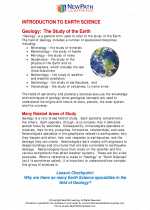 Introduction to earth science
Introduction to earth science  Activity Lesson
Activity Lesson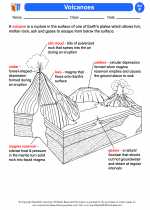 Volcanoes
Volcanoes  Worksheet/Answer key
Worksheet/Answer key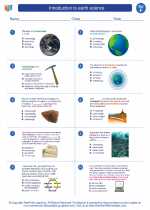 Introduction to earth science
Introduction to earth science  Worksheet/Answer key
Worksheet/Answer key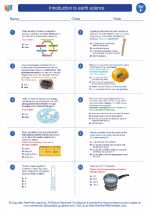 Introduction to earth science
Introduction to earth science  Worksheet/Answer key
Worksheet/Answer key Introduction to earth science
Introduction to earth science  Vocabulary/Answer key
Vocabulary/Answer key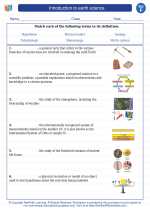 Introduction to earth science
Introduction to earth science  Vocabulary/Answer key
Vocabulary/Answer key Introduction to earth science
Introduction to earth science 

 Activity Lesson
Activity Lesson
 Worksheet/Answer key
Worksheet/Answer key
 Worksheet/Answer key
Worksheet/Answer key
 Worksheet/Answer key
Worksheet/Answer key
 Vocabulary/Answer key
Vocabulary/Answer key
 Vocabulary/Answer key
Vocabulary/Answer key

The resources above cover the following skills:
EARTH AND SPACE SCIENCE